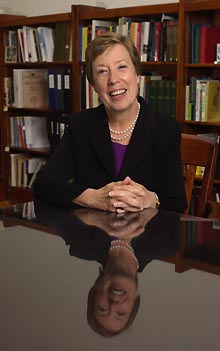|
This is an archived article.
For the latest news, go to the Advance
Homepage
For more archives, go to the Advance Archive/Search Page. |
||
|
As Dean Of The Law School,
Newton Leads By Example By Allison Thompson
"There's a little voice on my shoulder continually asking, 'What have you done lately?'," Nell Newton says.
Since Newton took over as dean in 2000, she has done a lot. The school is rapidly approaching its fund-raising goal, enrollment is up, and new programs are under development. Team Effort
Under her leadership, the Law School has raised $3.3 million and is already close to meeting its Campaign UConn goal of raising $5 million by June 30, 2004. Accomplishing that goal is an important part of Newton's strategy to gain the resources necessary to bring talented faculty and students to the school. Since 2000, 10 endowed scholarships have been added; and this year, two professors with expertise in business law joined the faculty, adding strength and depth to the Law School's business curriculum and raising the possibility of collaboration with the faculty of the School's nationally recognized Insurance Law Center. This year's first-year class is the strongest ever, reports Newton, with a median LSAT score of 160 and a higher undergraduate grade point average than that of previous classes. The students in the class were drawn from the largest applicant pool the Law School has ever seen, with applications up 46 percent over the previous year. The record may be shattered again next year, as the number of applicants to date has exceeded the number at this time last year. Newton says applications are soaring because of the School's growing national reputation. "Applicants are drawn to us because they have heard we foster a sense of community among our students and faculty," she says, "and that we have a very appealing 13-to-1 student-faculty ratio and classes that never exceed 70 students. Our excellent programs in insurance, international, and intellectual property law are also big draws." With so many well-qualified applicants, the Law School ended up with its largest first year class in recent memory. Newton is quick to praise those who helped accommodate the large entering class. Many professors volunteered to teach two sections of their required first-year courses. And the Board of Trustees, in the midst of the state and University's budget cuts, provided the resources needed to maintain the School's hallmark small classes. Newton, who joined UConn after a stint as dean of the University of Denver School of Law, feels as if she's still learning her way in Connecticut's legal and academic communities. But she's happy she made the move. "The longer I'm here, the more I feel I'm in the right place," she says. "Each day, I become more aware of our strengths, which include a culture of collegiality and consensus that would be the envy of any law dean." Newton hopes to tap these strengths in undertaking the tasks she has yet to tackle. Raising Expectations
"We need to set our sights higher," says Newton. "We need both the $10 gifts that demonstrate we have a base of loyal alumni, and the $10,000 gifts that enhance programmatic quality." Newton believes in putting her money where her mouth is. She donates $2,500 to the annual fund, makes payments on a pledge to create an endowed scholarship to honor the law faculty, and has included the scholarship in her estate plan. "If I'm going to ask people to remember us in their estates, give to the annual fund, and create endowments, I have to show them the way," she says. By increasing donations to the School, Newton hopes to be able to expand existing programs and create new ones. A nationally recognized expert in Indian law, Newton wants to build an Indian Law Center, which would focus on the special issues raised in the East when newly recognized tribes begin to operate as governments. "Western states have been dealing with these issues for years, but it is all very new on the East Coast," she says. "It is vital that we serve as a source of objective, unbiased, accurate, and scholarly information." The National Context
With other law schools beginning to focus on interdisciplinary teaching and scholarship, the Law School finds itself in the enviable position of already having one of the strongest interdisciplin ary faculties in the country. In the near future, Newton hopes to add faculty with expertise in health law. To add programs and faculty, Newton will need more room. She intends to expand the Law School's campus in Hartford's West End to include nearby Mackenzie Hall, which currently houses some staff from the Office of the Attorney General. Newton is pleased with all that's happened at the Law School during her two-year watch and hopes the positive trajectory continues, despite the difficult fiscal climate. "It's challenging to maintain an upward trend when state resources are limited," she notes. "For us to continue on this path, we will have to rely increasingly on partnerships with our alumni and our friends in the legal community in order to build a Law School that can be a source of pride for all Connecticut citizens." This article is part of an occasional series about the University's academic administrators. |
 f the dean of the School
of Law asks you to do something - whether it's donate to the
annual fund or find creative solutions to a problem - you can rest
assured that she's going to be doing it, too.
f the dean of the School
of Law asks you to do something - whether it's donate to the
annual fund or find creative solutions to a problem - you can rest
assured that she's going to be doing it, too.
